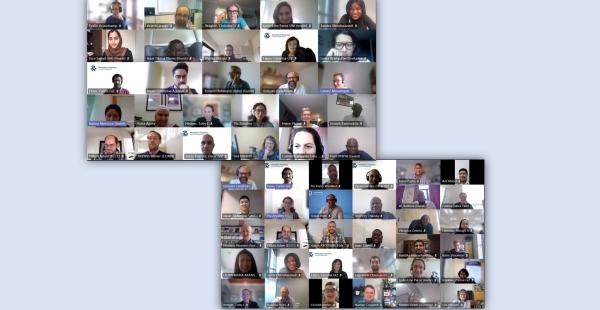
The 2022 11th (virtual) Edition of the Annual Partnership Retreat (APR) of the Partnership on Transparency in the Paris Agreement (PATPA)
Discussing and preparing (finally) the transition to the ETF!
The 11th edition of the Annual Partnership Retreat (APR) of the Partnership on Transparency in the Paris Agreement (PATPA), took place, once again and hopefully for the last time, in a full virtual mode on September 20 to 22, 2022.
Over three consecutive days, 112 participants engaged in the discussions: 97 country representatives from 49 countries and 15 non-party stakeholders from 9 international organizations.
The 2022 virtual edition of the APR was driven by the need to raise awareness internationally to urgently prepare to the transition to the Enhanced Transparency Framework (ETF) under the Paris Agreement.
With the Transparency negotiations entering an idle period, the 2022 edition marked the APR’s return to its roots of serving as a space for conversation among practitioners and negotiators. As in early editions of the APR, the focus shifted from supporting negotiations only to supporting implementation (but still allowing opportunity to discuss negotiation topics).
With this in mind, the agenda of the retreat was organized around three major daily themes, with clear linkages among them.
On the first day, participants were invited to discuss the global and national benefits of transparency, with a view to facilitating raising the profile of the topic in the national agendas and facilitating raising the required resources to fulfil the enhanced transparency requirements.
The participants highlighted the importance of an effective monitoring system for the purpose of monitoring the implementation and impacts of both mitigation and adaptation action. The need for such a system is clear irrespective of international requirements, and holds benefits for national policy making and implementation.
On the other hand, the information collected through the ETF (and through the current MRV framework) is crucial for an effective Global Stocktake (GST). Participants noted that it is important that each Party submits their Biennial Reports/Biennial Update Reports and then Biennial Transparency Reports (BTR) on time so that they can be considered in the data compilation reports prepared for the GST.
On the second day, the participants discussed the steps for and shared experiences on the transition to the ETF. The message was clear: there is no time to lose, as already time is short to take all the necessary steps to deliver the first BTR by December 2024, in particular for developing countries which may not have all the required capacities and resources readily available. The BTR Roadmap and Guidance Tool, jointly prepared by PATPA and FAO, is extremely useful in determining these steps and the required resources.
Some countries shared their experience noting that they are using the last report under the current MRV framework to test the implementation of some of the requirements for the BTRs, thus getting and advance identification of challenges, barriers and gaps.
The UNFCCC Secretariat shared with the participants that they are working at full speed to produce the IT tools mandated in Glasgow to facilitate reporting and compilation of the information submitted in the common tabular formats and in the common reporting tables. While participants, in particular from developing countries expressed concerns relating to the capacity to use such tools for the first submission, the secretariat noted that all countries will be invited to participate in the testing / training of the beta versions, which will give them a head start to build capacity for the respective use.
On the third and last day, participants had the chance to frankly exchange on potentially less clear parts of the Modalities, Procedures and Guidelines (MPGs).
The final discussion of the third day of the 2022 APR was dedicated to the last, or nearly last, negotiation item related to the ETF: the voluntary review of the information submitted in the BTR related to impacts and adaptation. Participants noted that the draft decision included in the co-facilitator note from the June SBs session shows that a decision is within reach in Sharm El Sheikh at COP27, despite some disagreement on some issues related to whether obligations for Parties to review the information reported should be placed or not.
At the end of the Retreat, despite the long nights for some and the early mornings for others, participants were once again of the opinion that the discussion were fruitful and helpful for their respective work, in particular for those directly tasked with preparing and implementing the transition to the ETF.
Please find the agenda of PATPA's 2022 edition of the APR for download on the upper right margin.
Please find below presentations made at the APR for download:
National and global benefits of climate transparency - Jennifer Huang, Center for Climate and Energy Solutions (C2ES)
Information accruing from MRV/Transparency to the GST - Sadamitsu Sakoguchi, Japan
Use of information accruing from MRV/Transparency for national policy making - Buddika Hemashanatha, Sri Lanka
Transition to the ETF - Henning Wüster, Initiative for Climate Action Transparency (ICAT)
PATPA’s and FAO’s BTR Roadmap and Guidance Tool - Carlos Essus, PATPA Secretariat (link leads to the tool)
Readiness to transition, including identification of key barriers and support needs - Camila Labarca Wyneken, Chile
Benefits of reviewing adaptation information - Emilie Beauchamp, International Institute for Sustainable Development (IISD)
Contact
Secretariat| Annual Partnership Retreat (APR) | Partnership on Transparency in the Paris Agreement (PATPA)
Catarina Tarpo & Carlos Essus
Email: @email
Co-organized by:
- Federal Foreign Office (AA), Germany
- Greenhouse Gas Inventory and Research Center (GIR), Republic of Korea
- The Department of Forestry, Fisheries and Environment (DFFE), Republic of South Africa

